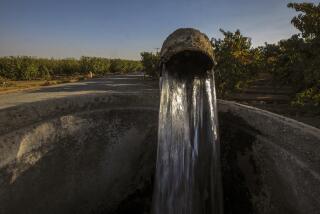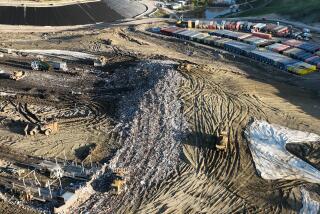Caltrans, Denounced for Pollution, Vows Cleanup
Caltrans faces mounting criticism from water regulators and environmentalists over polluted runoff flowing from state highways and construction projects into environmentally sensitive areas across Orange County.
Two local water agencies have issued cease-and-desist orders against Caltrans, demanding that it stem the tide of runoff from the San Joaquin Hills tollway and along a stretch of Pacific Coast Highway near Crystal Cove State Park.
Additionally, internal Caltrans reviews have shown that the Orange County regional district had among the worst, if not the worst, compliance record in the state when it comes to controlling erosion at its construction sites.
Caltrans officials said Friday they are taking steps to fix the problems.
In response to the cease-and-desist orders, Caltrans is finalizing plans to install improved storm water controls on the San Joaquin Hills tollway as well as parts of Pacific Coast Highway.
Also, Caltrans says it is making significant improvements to reduce erosion from road projects.
In an interview Friday, officials at Caltrans’ District 12 office, which covers Orange County, acknowledged a poor performance record over the last few years but said they are beginning to reverse that trend.
“I’m the first to admit we’ve had problems,” said Hank Alonso, a deputy director for the district. “But our latest results show substantial improvements.”
The moves come amid efforts by environmental watchdogs and water regulators to get Caltrans to comply with federal and state regulations.
The regulations require that agencies attempt to clean contaminants from storm water and other urban runoff.
The toxic brew that washes off highways includes lead from vehicle exhaust, copper dust from brakes, oil leaking from vehicles, animal waste and other pollutants that could harm humans and wildlife.
“There is so much evidence now of harm, I can’t think there is any thinking person who says this does not matter,” said Terry Tamminen, executive director of Environment Now, a Los Angeles nonprofit group.
One of the biggest cases involves the San Joaquin Hills tollway, which stretches from Newport Beach to San Juan Capistrano. Nearly 40 storm filters that were installed to handle the water flow from the freeway have been deemed faulty and are not being maintained.
Alonso said Friday that Caltrans will soon begin the first phase of a $13-million project to repair the filters or replace them with a variety of experimental treatment systems, including catch basins and skimmers.
At Crystal Cove, a state park between Newport Beach and Laguna Beach, Caltrans was found by a state water agency to be unlawfully discharging storm water through outfall drains that run from Pacific Coast Highway into the Irvine Coast Marine Life Refuge, one of the state’s two dolphin birthing grounds.
Alonso said Friday that Caltrans was preparing to submit a remedy for Crystal Cove by May. It hopes to comply with the cease-and-desist order by 2003. Under the $2-million plan, water would be diverted into nearby Muddy Creek and Los Trancos Creek, filtered through vegetative beds.
Caltrans is also trying to address problems identified in internal reviews conducted since 1997 to see how well the agency is complying with storm water provisions of the Clean Water Act at construction sites.
In these studies, Orange County has consistently ranked as one of the top offenders among all Caltrans districts when it comes to controlling erosion.
In the latest review, which covered the rainy season from October 2000 to April 2001, the county had the worst record, with more than half of the 18 projects inspected found to have either critical or major deficiencies.
“Critical deficiencies” are the most serious violation and require immediate correction under Caltrans criteria. They involve actual erosion and siltation unlawfully reaching storm drains, with a potential of discharging hazardous waste. For example, at a construction yard where heavy equipment is stored, gasolines or oils may have been spilled.
“Major deficiencies” require immediate attention and include unprotected slopes, conditions that can lead to potential discharges of sediment or hazardous waste.
One local environmental group, Orange County Coastkeeper, has sent a letter of complaint to the Caltrans’ Orange County director expressing concern that the construction zone runoff violates the Clean Water Act.
“There have been lots of bad grades handed out when it rains,” added Richard Horner, storm water consultant for the National Resources Defense Council, which has successfully sued Caltrans over runoff issues in Los Angeles.
But Horner agrees with Caltrans officials’ argument that the reviews show how willing the agency is to police itself and improve its performance record.
“Headquarters appears to be concerned about this. It is one of the better things Caltrans does. They are quite critical and the conclusions are not sugar-coated.”
More to Read
Sign up for Essential California
The most important California stories and recommendations in your inbox every morning.
You may occasionally receive promotional content from the Los Angeles Times.











